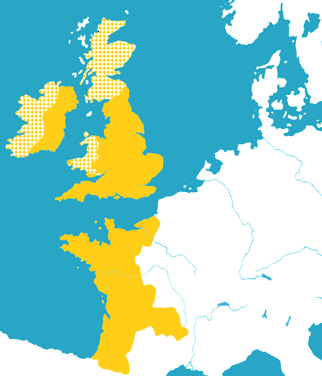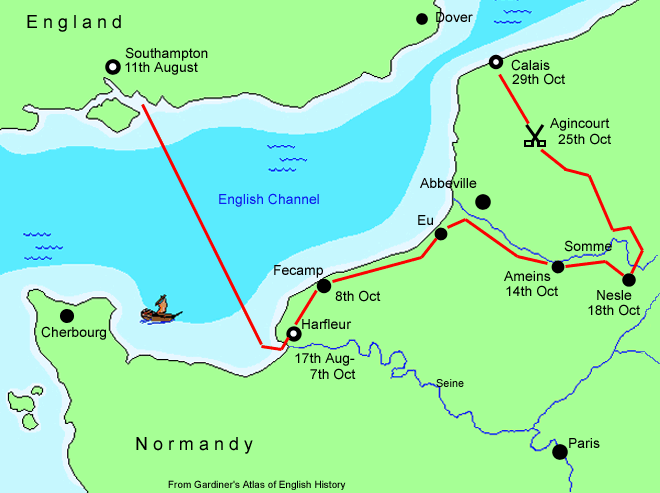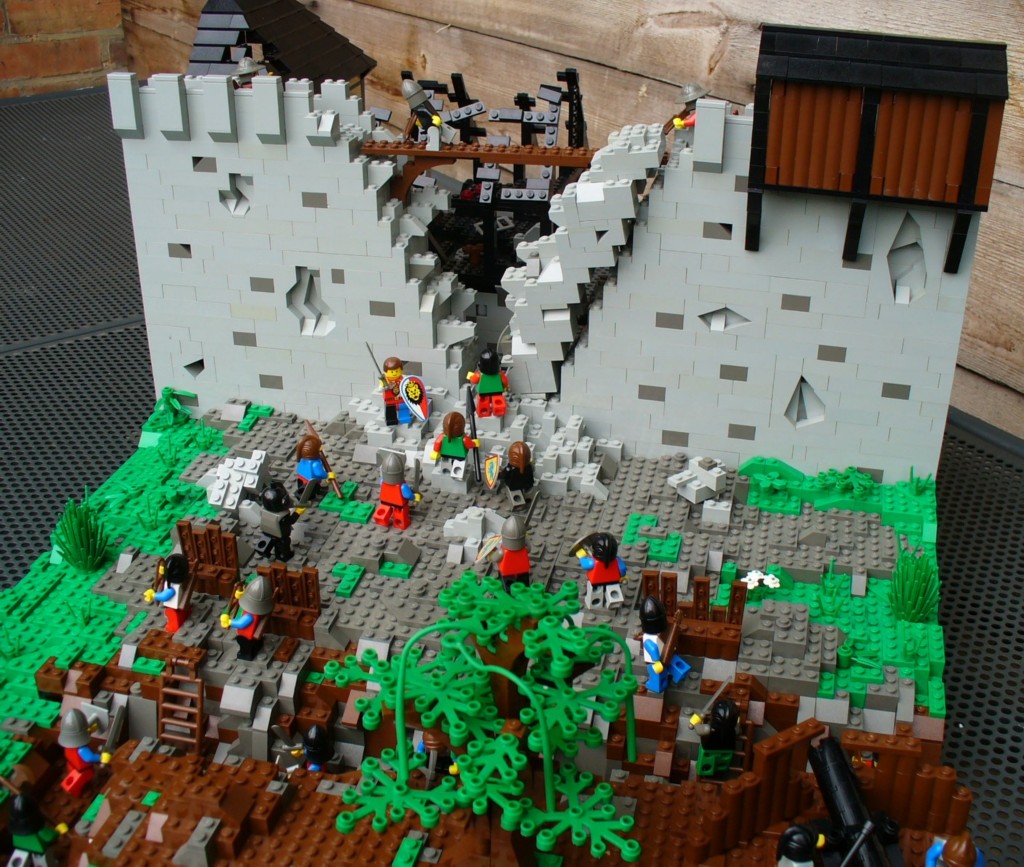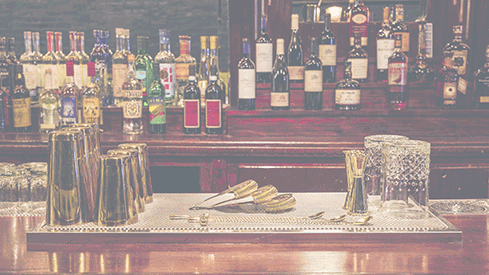After reading Navy's excellent post on Leyte Gulf, there seemed to be some interest in more military history posts, so, I figured I could throw in a thing or two. With the 600th anniversary of the Battle of Agincourt, it seemed like an appropriate time to post something about it. Especially since this is a pretty calm Sunday in Buckeyeland.
The Hundred Years War (1337-1453)
The Battle of Agincourt has some fairly deep historical roots. The Battle was part of the much larger Hundred Years War, which is a bit of a misnomer. The war actually lasted for 116 years, though, the war wasn't always hot between the two major combatants, the Kingdom of England and the Kingdom of France. However, the two kingdoms were always in opposition in the period. When they weren't fighting each other, they tried to get each other stuck in wars against other enemies, such as the French encouraging wars between England and Scotland, and the English encouraging the Dukes of Burgundy to fight the French.
The Kingdoms of France and England had long had an intertwined history, even before the Hundred Years War began. In 1066, William the Bastard of Normandy, nominally a French vassal, invaded and conquered England, becoming, of course, William the Conqueror. William, however, retained his lands in Normandy as well as in England, making him still, in theory, a vassal of France. It also kept him, and his successors locked into the politics of France. The great English King Henry II (r. 1154-1189) pulled himself in even deeper with his brilliantly timed marriage to Eleanor, Duchess of Aquitaine, who, as a widower, held the rights to Aquitaine and Gascony in southern France. Henry won a pile of wars in France and Ireland, building a massive Empire:

Unfortunately, Henry II had many sons, who were all as ruthless and ambitious as he was. They fought amongst themselves, encouraged by the Kings of France, and the good ones died young. This ultimately left John Lackland, a man so stupid he thought he was brilliant, in charge of England. At the same time, Philip II Augustus became King of France, and he chopped large chunks out of the English holdings in France. Throughout the 1200s, the Kings of France and England fought over Henry II's old empire in France. To settle this issue, Edward Longshanks of England married his son, the future Edward II, to Philip the Fair of France's daughter, Isabella, in 1308. By being in-laws, they hoped to end a century and a half of war.
It didn't take. Philip's son, Charles IV, died without a son. All of his brothers had died- one after an exhausting tennis match, the other from a succession of diseases one might see in a moderately good episode of House, MD. This left the succession in disarray. The closest male relative (No woman could sit on the throne of France, of course) was actually Edward III of England. However, his claim was through his mother, Isabella. Just a few years before Charles' death, the nobility of France declared that no one could gain a title through a woman's claim, and, thus, Philip of Valois became Philip VI of France. Edward seemed okay with this, until Philip started supporting the Scots in their wars against England. Then, it was on like Donkey Kong.
In 1337, Edward declared himself the true King of France, and invaded southern France from English holdings in Gascony. War raged for 23 years (Including a sizeable break for the Black Death). While the English often held the field against the French, winning the battles of Crecy and Poitiers, while devastating large areas of France in the Black Prince's Chevaucees, they were unable to take the large, fortified cities in Northern France one needed to hold to be King of France. In 1360, the two sides negotiated a truce, where Edward the Black Prince renounced his claim to France and territory in northern France, in return for a pile of cash and more land in Aquitaine. The two sides weren't really done, though. Throughout the rest of the 1300s, the two sides fought each other in a series of civil wars in Iberia. However, this long conflict caused problems in the 1390-1410s. In England. Richard II led a rather paranoid reign with high taxes that led to numerous revolts, ending in him losing the throne to Henry of Lancaster. Charles VI of France began a descent into madness, prompting the Dukes of Burgundy, who had a claim to the French throne, to make a go of it in the early 1400s. The Valois held on, but Charles VI was basically done for. France was run by a series of deeply divided councils.
In 1413, Henry of Lancaster died, leaving the throne to his son, Henry V. Henry faced rebellion at home, but saw weakness in France. Hoping to end rebellions at home by giving his nobles someone to fight other than him, he declared himself the true King of France, allied with the Duke of Burgundy, and invaded France.

The 1415 Campaign
Henry V sailed across the English Channel, and landed in Normandy in August 1415- well behind schedule for a good campaign. He then marched on Harfleur, a major port in the area. Harfleur was well fortified and protected, and held out longer than Henry had hoped, falling a month and a week after Henry's arrival. Henry was running short on campaigning time. Even worse, dysentery struck his army at Harfleur, killing 3,000 men out of an army of 12,000.

The Breech at Harfleur, in Lego.
Running low on time, Henry decided to taunt the French, rather than launch another siege. He decided to march to Calais, then held by the English, through Normandy. Leading an army through lands he claimed would, he hoped, help support his right to rule in the area, and let him rebuild his army for more efforts in 1416. Disease never really left his camp, either, killing another two or three thousand men along the route from Harfleur to Agincourt. Henry's Campaign, 1415
The French weren't sitting on their hands for this, of course. Once Henry landed, his delays at Harfleur let the French assemble a good sized army- modern estimates say 12-15,000 men, while Henry's historian put the number at 36,000. This army went to shadow Henry's troops. The French remembered the rather stinging defeats of Crecy and Poitiers, and didn't want a repeat of that. Plus, Henry's army was starving and shitting itself to death as the weather got worse and worse. Why mess with a good thing?
On October 24th, the French decided to put an end to this farce. They put their army along the road to Calais near the town of Agincourt. The French put their army on the road just above two wooded hills. The English would have to take a very long route around them, and that wasn't really in the cards for Henry, if he wanted to not freeze and starve to death.
Backed into a corner, Henry V did the only thing he could do: he decide to fight. He marched his troops into the narrowest part of the defile between the two hills, so that the French knights couldn't ride around them. He deployed his knights dismounted in the center- he had about 1,000 of them- and then put his archers in "sleeves" along the flanks, making something of a V shape. His men then drove stakes into the ground in front of them to ward off horses. Additionally, Henry sited his troops in a plowed field, which had been soaked in rain, making it very muddy.
The English move forward on October 25th forced the French to react. Their army was within range of English archery, and so they had to attack. The narrow terrain, however, prevented them from getting all their troops to bear on the English at once, forcing them to deploy in three separate lines. These lines then had to cross the muddy field in 50 or 60 pounds of steel with very poor ventilation, under a withering fire. As the terrain narrowed, so did the French formations, making it even harder to move. Men fell from arrow fire, exhaustion, and being knocked off balance, which distrupted the French formations even more heavily. The French troops of the first line made it to the English line in disarray and exhausted.
Making things even worse for them, the second line was close behind them, and began pressing the first line forward. The lines were so packed, it was impossible to swing a sword or a hammer. Men were crushed to death, knocked off their feet and drowned in mud, or simply driven to the ground, too weak to get up. This made them easy prey for the fresher English knights. However, quantity has a quality all its own, and the sheer weight of the French effort began to push back the English knights in the center.
At this point, the English archers fell on the flanks of the French. Exhausted by fighting and marching, and dealing with fresher troops in much lighter armor, the French began to collapse. Men broke, fleeing the melee, trampling each other. Others lay on the ground, suffocating to death, dying of heat exhaustion, or to be massacred by the English archers as they lay. Many great nobles of France, leading the attack, were killed or captured, and the French army dissolved. Somewhere between a few hundred and a thousand English lay dead. The French lost somewhere between 7000 and 10000 men, with another 1000 prisoners taken.
Short Term Aftermath
Agincourt let Henry bail himself out of a rather disasterous campaign. It also provoked great disarray in French government. So many powerful men died, were captured, or were disgraced at Agincourt that a power vacuum filled France, which took several years to sort out. Henry resumed his campaigns, but, like Edward III, found taking the fortresses of north-central France impossible. Instead, the two sides reached a compromise in 1420. Charles VI recognized Henry V as his heir, and married his daughter, Catherine, to Henry. All Henry had to do, then, was outlive a 51 year old man. Henry was, himself, 33.
He didn't make it. He returned to France in 1421 to put down a rebellion. He contracted dysentery at the Siege of Meaux, and died in 1422, three months before Charles VI of France died. Henry's son, Henry VI, wasn't even a year old, while Charles VI's son, Charles VII (later known as Charles the Victorious) was a young, vigorous man who had already fought bravely against the English in many battles in his teenage years. Given the choice between a baby king they couldn't control, and a young man they liked, they rejected Henry VI's claim, and backed Charles VII's efforts to restart the war.
The war went rather badly for the English. Charles gave command of his armies to a rather charismatic peasant woman, Joan of Arc, who led the French to several victories before her capture. Her efforts led to the Dukes of Burgundy switching sides in 1435, and let the French focus on English holdings. Meanwhile, Henry VI grew up, and turned out to be a paranoid schizophrenic. His madness led to strife in England, which would culminate in Robert's Rebellion The War of the Roses between the Houses of Baratheon York and Targareyn Lancaster. By the time the English could negotiate a peace in 1453, they had lost all of their lands in France outside of the city of Calais. The Tudors would, eventually, see England as an island, not continental, kingdom.
Long Term Aftermath
So, then, was the Battle of Agincourt three hours of sound and fury, signifying nothing? I suppose it depends on your perspective. For the French nationalist historians of the 19th century, the battle was just another speedbump in the 700 year story of French Unification that began with the election of Hugh Capet and ended with the Edict of Fountainbleau. Not their best day, overall, but, in the end, Paris is just too hard to conquer, and Henry was just one of a long line of men (some also named Henry) who found that out themselves. For the British, it's another glorious victory in a long line of glorious victories fought in some distant land or sea to take control of an area that they had to give up in the end because the locals didn't like having the English around for some reason or another. Generals have looked to Agincourt for inspiration, both in terms of leadership and tactics. Military historians lookat Agincourt, and the whole Hundred Years War, as part of a three hundred year process that ended the feudal military and political order.
At least we got this out of the battle:
And that's worth something.
